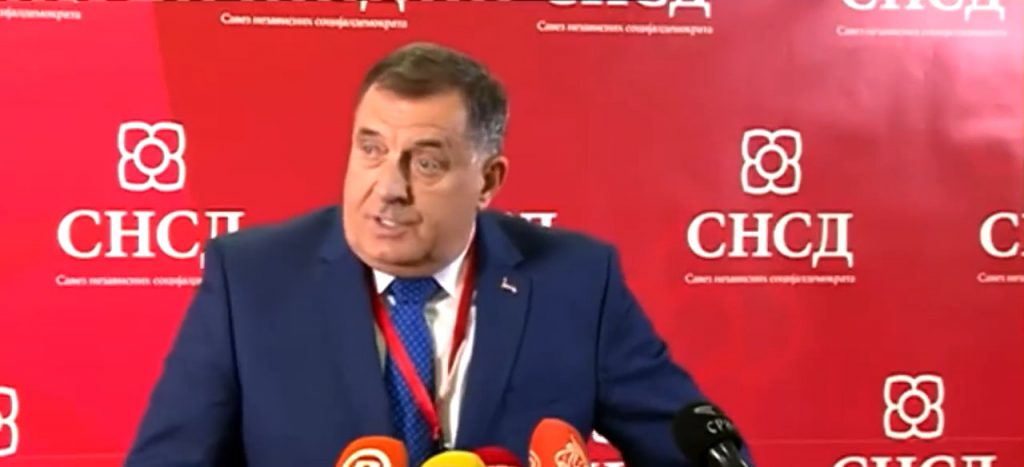US Sanctions Bosnian Serb Leader Dodik For “Destabilizing And Corrupt Activity”
The United States has imposed new sanctions on Bosnian Serb leader Milorad Dodik, a television station closely linked to Dodik, and two other Bosnian officials for “destabilizing and corrupt activity”.
The sanctions follow several months of threats by Dodik that the Bosnian Serb entity of Republika Srpska he leads would secede from Bosnia, claiming to have support from Serbia and Russia in his bid to do so. Alongside threatening the withdrawal of Bosnian Serb representatives from the Bosnian army and other national institutions, Dodik has announced plans to reform the Bosnian Serb Army, a Bosnian War-era paramilitary group found guilty of genocide during the war.
The sanctions freeze assets owned by Dodik in the United States, with the Department of the Treasury emphasizing the corruption said to be the driving force for his secessionist rhetoric. In a Wednesday statement announcing the sanctions, the Treasury said:
“His divisive ethno-nationalistic rhetoric reflects his efforts to advance these political goals and distract attention from his corrupt activities. Cumulatively, these actions threaten the stability, sovereignty, and territorial integrity of BiH and undermine the Dayton Peace Accords, thereby risking wider regional instability.”
Dodik is also described in the announcement as “being responsible for or complicit in, or having directly or indirectly engaged in, a violation of, or an act that has obstructed or threatened the implementation of, the (Dayton Peace Accords)”, the 1995 agreement that ended the Bosnian War and established Bosnia’s current constitution. He had previously been sanctioned in 2017 for obstructing the Accords, with the Treasury saying that the new sanctions “build on this legacy”.
Sanctioned alongside Dodik is Alternativna Televizija (ATV), a television station described as Dodik’s personal television station, based in Banja Luka, the de facto capital of Republika Srpska. The Treasury states that:
“Dodik has awarded ATV-related contracts directly to members of his family, which he has used as yet another avenue for corruption. He has funneled money directly from public companies to ATV for corrupt purposes. Dodik has substantially increased funding for ATV in recent years and engaged in malign social media influence campaigns through ATV to publish content that advances his political and personal goals.”
While Dodik struck a defiant tone in response to the sanctions, telling media in Banja Luka that Washington was “badly mistaken” if they believed that the sanctions would deter him, an outburst saw him claiming that “As far as the Americans are concerned…all that’s left is for them to kill me, for them to remove me”.
Dodik adviser and former Bosnia and Herzegovina (BiH) High Judicial and Prosecutorial Council (HJPC) President Milan Tegeltija was also banned from entry to the United States. Secretary of State Antony Blinken stated in a press release that there is “credible information” that Tegeltija had abused his position as head of Bosnia’s judiciary to wield political influence and official power for his personal benefit.
Bosniak member of parliament Mirsad Kukic was banned from entering the United States as well. The president of the Movement for Democratic Action is accused of using his parliament seat and role as manager of the publicly owned Banovici mine to embezzle funds for personal benefit, as well as interfering in hiring and appointment decisions for personal political benefits. His wife, Tijana Tegeltija, was also banned from entering the US alongside him.
While the sanctions represent a symbolic blow to Dodik’s aspirations, regional observers note that further sanctions from the United States and European countries in particular will likely be needed for them to deter his secessionist moves, with political scientist Jasmin Mujanović saying that Dodik’s show of defiance was “to be expected”.

